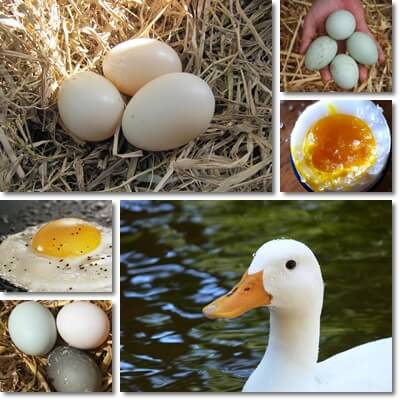Compared to chicken eggs, duck eggs are a less popular food, yet surprisingly nutritious. Duck eggs are rich in protein, fats and cholesterol, have no dietary fiber and only 1.45 g of carbohydrates. They have an energetic value of 185 kcal per 100 g and are a valuable source of essential nutrients. Vitamins and minerals in duck eggs include vitamin A, B vitamins, especially important amounts of vitamins B12, folate, thiamine and riboflavin, iron, phosphorus, potassium, sodium and zinc. Considering their nutritional value, duck eggs are an overall healthy food and good for you in limited amounts, as part of an overall healthy and balanced diet.
What do duck eggs look like?
Duck eggs are oval-shaped and considerably larger than chicken eggs. On average, one duck egg weighs 70 g compared to one chicken egg which weighs about 50 g. Depending on the duck species, duck eggs shell may be white, cream-colored to light green. Duck eggs also have a harder shell than chicken eggs. Compared to chicken eggs, duck eggs have a higher yolk to egg white ratio which accounts for the higher protein and especially higher fat content of duck eggs and, of course, higher energetic value since most of the calories in eggs are in the yolk.

What do duck eggs taste like?
Considering duck eggs have more egg yolk than chicken eggs, and that egg yolk is where most of the fat is stored, duck eggs taste differently from chicken eggs. More exactly, they have a richer flavor profile and can be described as having a fattier taste with a creamier texture. Some people prefer duck eggs to chicken eggs because of their more particular flavor. Duck eggs are also said to have a longer shelf life of up to 6 weeks, if refrigerated properly. However, duck and all eggs are best eaten as fresh as possible and always thoroughly cooked.
What are the health benefits of duck eggs?
Based on their nutritional value, duck eggs provide the following benefits for health:
Rich source of protein
How much protein in duck eggs? 100 g of duck egg contains 12.81 g of protein, almost 25% of the recommended daily intake for the average person on a 2000 kcal diet. In other words, a lot of protein. Protein is valuable for building muscle mass and helping repair damaged muscle fibers, as well as contributes to strong and beautiful hair.
The amino acids that make up the protein in duck eggs also help synthesize neurotransmitters in the brain that regulate mood, appetite and sleep, and hormones that regulate fertility and metabolism, but also sleep, mood, energy levels and productivity. Both the egg white and yolk in duck eggs contain protein so there are benefits to eating both parts of the egg.
High in fat, cholesterol and calories
The number one reason why most people avoid duck eggs is because they have more fat, more cholesterol and more calories than chicken and quail eggs. And that is true.

How much fat in duck eggs?
There are 13.77 grams of fat in 100 grams of duck eggs. One duck egg at an estimated average weight of 70 grams has 9.64 grams of fat of which 2.58 grams are saturated fat, 4.57 grams are monounsaturated fat and 0.85 grams are polyunsaturated fat.
How much cholesterol in duck eggs?
There are 619 milligrams (mg) of cholesterol in one duck egg weighing 70 grams. A serving of 100 grams of duck eggs, whole, egg white and egg yolk, provides 884 milligrams (mg) of cholesterol. According to the new dietary guidelines, the average adult on a 2000 kilocalories diet can eat up to 300 milligrams of cholesterol a day.
How many calories in duck eggs?
One duck egg has 130 kcal (kilocalories). A serving of 100 grams of duck egg provides 185 kilocalories, as much as one goose egg.
Find out more about how the difference between duck eggs vs goose eggs.
Are duck eggs not good for you?
Duck eggs are avoided because they are naturally high in calories which come from a high content of fat and cholesterol. Despite being villainized, fat and cholesterol have excellent nutritional value and provide a host of benefits for health. In fact, fat and cholesterol are only bad for you in excessive intakes. So as long as you eat duck eggs in moderation. and have an overall balanced and varied diet that suits your nutritional requirements, the intake of fat, cholesterol and calories from duck eggs should not reflect badly on your healthy
If, on the other hand, you are suffering from obesity and associated diseases and conditions such as high blood pressure, high blood cholesterol, high blood sugar, diabetes etc., then it might be best to first talk to your doctor and revisit your diet before adding other nutritional dense foods to it, especially foods high in fat, cholesterol and calories such as duck eggs.
A good rule is to only introduce duck eggs in your diet after having excluded all unhealthy sources of fat, cholesterol and high-calorie foods. Because the human body needs fats, cholesterol and calories to stay alive and be healthy, but it’s just as important to get them from healthy food sources and in limited amounts. Also see how many eggs you should eat per week to be healthy.
Excellent brain food
The fats, cholesterol and protein in duck eggs serve as nourishment for the brain and promote brain and nervous system health. Eating duck eggs can help restore focus, support memory and learning and reduce and prevent brain fog.
Moreover, the high content of cholesterol and vitamin B12 in duck eggs helps protect the integrity of the myelin sheath surrounding the tail of nerve cells. Without fats in general, especially cholesterol, and vitamin B12, the protective myelin coating could lose its integrity over time and leave nerve cells without insulation. The degradation of the myelin sheath represents a risk factor for degenerative nervous system diseases like multiple sclerosis.
Contain vitamins A, D and zinc
Duck eggs are a good source of vitamins A, D and zinc. Eating duck eggs contributes to a stronger immune system, stimulates faster wound healing, contributes to better eyesight, healthier and better looking skin and stronger nails.
- How much vitamin A, vitamin D and zinc in duck eggs?
- Vitamin A content in duck eggs: 194 mcg (micrograms) of vitamin A per 100 grams of duck egg. The average adult needs 900 mcg of vitamin A a day.
- Vitamin D content in duck eggs: 1.7 mcg (micrograms) of vitamin D per 100 grams of duck egg. The recommended daily intake is 20 mcg of vitamin D for the average adult.
- Zinc content in duck eggs: 1.4 mg (milligrams) of zinc. The recommended daily intake is currently 11 mg of zinc.
Rich in B vitamins, boost energy levels
Eating duck eggs provides not only fat and calories to boost energy levels, but also a good content of vitamins B1 (0.156 mg), B2 (0.404 mg), B3 (0.200 mg), B6 (0.250 mg), B9 or folate (80 mcg) and B12 (5.40 mcg).
What are the benefits of B vitamins in duck eggs? B vitamins contribute to digestive health, helping the body process nutrients from food, support and help grow healthy gut bacteria populations, and help the body synthesize other vitamins and neurotransmitters for the brain and nervous system. So eating duck eggs is good for digestion and the brain, as well as energy metabolism.
Good iron content
Duck eggs provide good amounts of iron. How much iron in duck eggs? A serving of 100 g of duck eggs contains 3.85 mg (milligrams) of iron out of the 18 mg recommended daily value for an average adult. Iron helps transport oxygen in the blood to muscle and other tissues, boosting vitality for a sense of good physical health. Because of their good iron content, duck eggs are one of the most valuable foods you can eat for anemia, provided of course intake is limited and reasonable.
Important source of phosphorus
How much phosphorus in duck eggs? With 220 mg (milligrams) of phosphorus per 100 grams, duck eggs provide close to 25% of the recommended daily intake, RDI, of the essential dietary minerals. Thanks to a good phosphorus content, duck eggs are a good food to eat for healthy bones and teeth. Phosphorus not only physically makes up bones, but also triggers the processes required to dissolve and remake bone tissue, processes that ensure a strong and healthy bone structure throughout one’s lifetime.
Duck eggs help you absorb fat-soluble vitamins
One of the benefits of eating duck eggs is the fact that the fats in duck eggs are essential for absorbing fat-soluble vitamins such as vitamins A, D, E and K. Fat-soluble vitamins are vitamins that dissolve in fat, meaning they require fat to be transported in the body and produce their benefits.
Fat soluble vitamins hold benefits for vision, support, modulate and enhance the immune system function, contribute to skin integrity, wound healing and skin rejuvenation, and blood coagulation processes. Duck eggs further contain modest amounts of sodium (146 mg/100 g), potassium (222 mg/100 g), magnesium, calcium and vitamin E. Potassium and magnesium are good for high blood pressure.
How to cook duck eggs – unique recipes
You can make soft-boiled, hard-boiled, baked, fried, scrambled or poached duck eggs and they will taste great. But the most popular duck egg recipes include:
Red salted duck egg (or simple salted duck egg)
What are red salted duck eggs? They are preserved duck eggs, soaked in brine to give them a salty or briny flavor. How to make red salted eggs? Clay, salt and water are mixed until you get a smooth, thick paste. Duck eggs are then covered in the mixture and left to cure at room temperature for up to 2 weeks or more. At the end of the curing period, they are usually boiled. In some countries, they are dyed red to tell them apart from fresh duck eggs.
Century egg with duck eggs
In Chinese cuisine, duck and other eggs are preserved in a paste of clay, quicklime, wood ash, salt, calcium oxide and rice hulls for up to several months. The resulting product is a dark-colored, briny and strong-tasting egg. The egg white becomes brown-colored, while the yolk dark green to grayish-black.
Balut eggs
It is a popular street food in Philippines, Cambodia, Thailand, Vietnam and all over South Asia. Duck and sometimes other eggs are incubated and after 9 days or more, boiled and served as food. The eggs are eaten out of the shell.
Conclusion
Duck eggs are a healthy, nourishing food and an important source of vitamins and minerals. Although particularly rich in fats, cholesterol and calories, they remain a healthy food option when eaten infrequently, as part of an overall healthy and balanced diet. Duck eggs stand out as an excellent source of protein, vitamin B12 and iron and make a wonderful food for the brain, are satiating and energizing. However, remember to always cook duck and all eggs thoroughly because eating raw or undercooked eggs of any sorts can lead to bacterial infections such as Salmonella or Escherichia coli.
